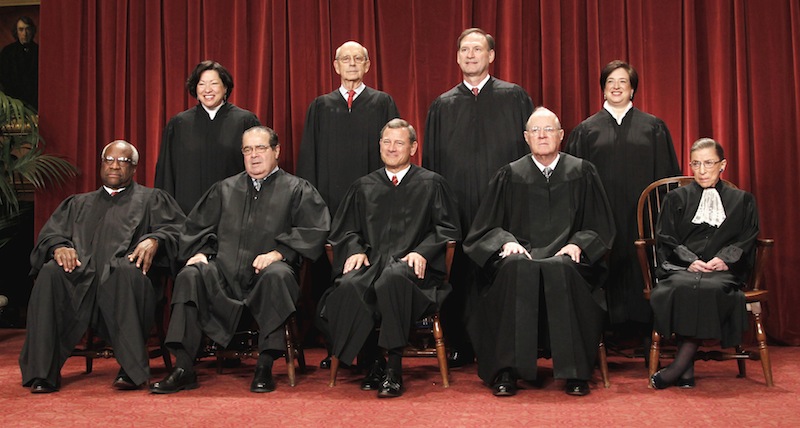The Supreme Court reminded Americans on Monday that national marriage equality isn’t coming in a hurry.
The Court issued an emergency order to halt U.S. District Judge Robert Shelby’s ruling on Dec. 20 that legalized same-sex marriage in Utah, declaring that gay couples have a constitutional right to marry. Sonia Sotomayor, the Obama-appointed justice with jurisdiction, turned the matter over to the full court, instead of acting alone. None of the justices wrote a dissent in the decision to issue the stay.
The order doesn’t reveal much about the justices’ views on the merits of the case. It more likely suggests they want the full case to be heard by an appeals court, and perhaps the Supreme Court, before letting the decision stand.
“I don’t read much into this other than the Court wanted to freeze the status quo until the 10th Circuit and ultimately the Supreme Court ruled,” said Erwin Chemerinsky, a professor and dean of UC-Irvine School of Law. “I don’t think it says anything about how the Court is likely to decide whether there is a right to same-sex marriage; it was just a decision to keep the status quo until higher courts can hear it.”
“The justices like to maintain the status quo during appeals,” said Adam Winkler, a professor at UCLA School of Law who supports marriage equality. He added: “Regardless of ideology, today’s justices like to have the final say on everything. They don’t want the marriage question decided by a trial court judge.”
The Court’s order Monday means the state of Utah is entitled to a ruling by the 10th Circuit Court of Appeals on the merits of the case. After that, the losers can appeal the decision with the Supreme Court. The whole process could take months, if not longer.
“Since the Monday order provided no explanation, it was not clear which of the arguments made by state officials had been convincing to the Justices,” wrote Lyle Denniston, a Supreme Court reporter at SCOTUSblog.
National public opinion is rapidly shifting toward marriage equality. Seventeen states and the District of Columbia have legalized it. It remains elusive at the ballot box in socially conservative states like Utah. Proponents of same-sex marriage are as optimistic about eventually winning the battle as opponents are fatalistic about losing it. The question is how long it takes — and whether the courts or the voters go first.
“The Supreme Court made the correct decision to stay Judge Shelby’s ruling in the Amendment 3 case,” said Utah Gov. Gary Herbert, a Republican, in a statement. “Clearly, the stay should have been granted with the original District Court decision in order to have avoided the uncertainty created by this unprecedented change.”
Some 900 same-sex couples have married in Utah since Shelby’s decision, according to The Associated Press.
Social change via the courts tends to happen at a slow pace. It took the Supreme Court 10 years to go from overturning state bans on consensual sodomy to ensuring equal federal benefits for married gay and straight couples. And yet a pair of landmark decisions by the Court last summer punted on the question — explicitly sought by the legal parties involved — of whether the equal protection clause of the 14th Amendment forbids marriage discrimination against same-sex couples.
The Supreme Court’s message Monday was that it is in no rush to address that fundamental question — nor does it want a district judge to settle it.
“We already know that five justices understand how the law is being used
to deny LGBT people equal rights,” said Winkler. “None of the arguments in support of marriage discrimination are any better than those used to justify [the Defense of Marriage Act]. The constitutional arguments against marriage equality are just plain weak.”
Supreme Court order granting Utah a temporary stay on same-sex marriages by tpmdocs






